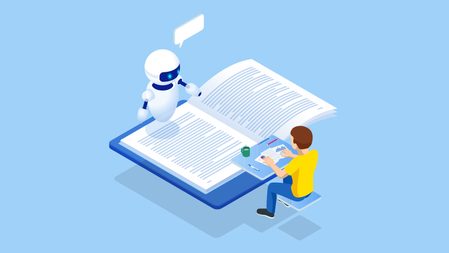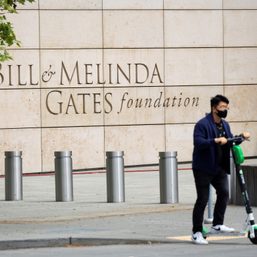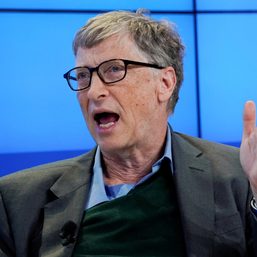SUMMARY
This is AI generated summarization, which may have errors. For context, always refer to the full article.

MANILA, Philippines – There’s a lot of excitement but also a lot of fear with the quick emergence of ChatGPT late last year; its rise making everyone, from deep-pocketed Silicon Valley venture capitalists to your common tech enthusiast, turn their attention towards it, and artificial intelligence in general.
Microsoft co-founder Bill Gates, who is not your average ordinary tech enthusiast, has chimed in as well. In a blog post, March 21, the Gates Foundation philanthropist wrote in length about the promise of the technology, comparing it to when he first encountered a graphical user interface, which became an inspiration for his own Windows operating system.
“In my lifetime, I’ve seen two demonstrations of technology that struck me as revolutionary. The first time was in 1980, when I was introduced to a graphical user interface – the forerunner of every modern operating system, including Windows,” Gates said.
The second one, as you may have guessed, is Microsoft-backed OpenAI’s GPT, the AI model behind ChatGPT.
He recalled giving the team a challenge: train its AI to ace an Advanced Biology exam, which Gates said required critical thinking more than simple regurgitation of a body of facts. After a few months, GPT aced the exam, scoring the highest possible score, as assessed by a third party expert.
“I knew I had just seen the most important advance in technology since the graphical user interface,” Gates said.
Health and education
Gates said, the “development of AI is as fundamental as the creation of the microprocessor, the personal computer, the Internet, and the mobile phone. It will change the way people work, learn, travel, get health care, and communicate with each other. Entire industries will reorient around it. Businesses will distinguish themselves by how well they use it.”
But he identified healthcare and education as the two big sectors where AI could help reduce inequity “if it is properly targeted.”
AIs will, for example help health workers be more productive, reducing the burden of more administrative tasks, and speeding up diagnosis with machines like AI-powered ultrasound machines, and help people perform basic triage by themselves.
“In addition to helping with care, AIs will dramatically accelerate the rate of medical breakthroughs. The amount of data in biology is very large, and it’s hard for humans to keep track of all the ways that complex biological systems work,” Gates said.
The former tech executive, though, stressed that AI models “used in poor countries will need to be trained on different diseases than in rich countries. They will need to work in different languages and factor in different challenges, such as patients who live very far from clinics or can’t afford to stop working if they get sick.” He also said that these AI technologies need to be properly “regulated and tested.”
For education, Gates said that AI’s benefits will be in knowing how best to keep a student engaged. He said, “…in the next five to 10 years, AI-driven software will finally deliver on the promise of revolutionizing the way people teach and learn.”
“It will know your interests and your learning style so it can tailor content that will keep you engaged. It will measure your understanding, notice when you’re losing interest, and understand what kind of motivation you respond to. It will give immediate feedback.”
He noted familiar concerns regarding the inequality that can arise from new technologies. “AIs will need to be trained on diverse data sets so they are unbiased and reflect the different cultures where they’ll be used. And the digital divide will need to be addressed so that students in low-income households do not get left behind.”
Gates also chimed in on ChatGPT being used by students to write essays, and said that these will be “conversations that will continue for some time.”
“I’ve heard about teachers who have found clever ways to incorporate the technology into their work—like by allowing students to use GPT to create a first draft that they have to personalize,” he noted.
Valid fears
While it’s easy to be enamored with the promise of a new technology, Gates stressed that, if the markets were given free reign, it won’t “naturally produce AI products and services that help the poorest.”
“The opposite is more likely.”
We’ve seen in the past how new technologies were brandished as a great savior against inequality, only – all too often – for it to come short of expectations. AI isn’t the exception to the rule.
He also warned that it is not out of the realm of possibility for AI to determine that humans are a threat, or for AI tools to be used for “malign” purposes.
So from Gates, a few, perhaps necessary, truisms: “The world needs to make sure that everyone—and not just people who are well-off—benefits from artificial intelligence. Governments and philanthropy will need to play a major role in ensuring that it reduces inequity and doesn’t contribute to it. This is the priority for my own work related to AI.”
“With reliable funding and the right policies, governments and philanthropy can ensure that AIs are used to reduce inequity. Just as the world needs its brightest people focused on its biggest problems, we will need to focus the world’s best AIs on its biggest problems.” The Gates Foundation, he said, will have more to say about AI in the coming months. – Rappler.com
Add a comment
How does this make you feel?









There are no comments yet. Add your comment to start the conversation.